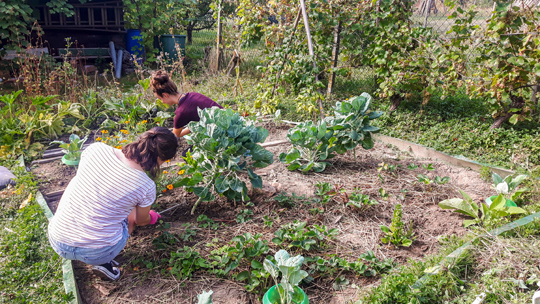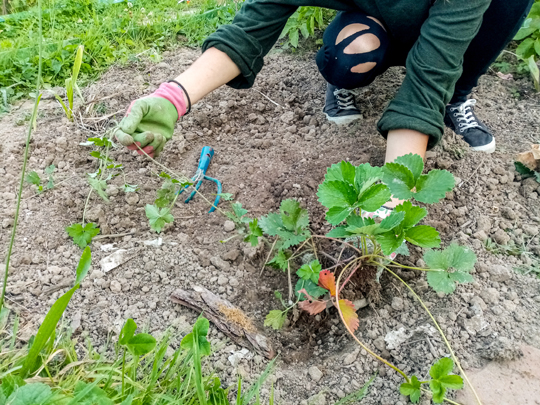Sustainable Gardening
Freiburg, Jan 11, 2021
The term “sustainability” comes originally from forestry and is used today in all sorts of contexts. The question is what it actually means. Dr. Sabine Sané is responsible for the field of environmental and sustainability sciences at the University of Freiburg’s University College. In a newly designed seminar, her students learned about the theoretical and practical side of gardening. At the beginning, the course participants considered what “sustainable” could mean in relation to gardening – because finding that out was the goal of the seminar.
 Theory and practice: In the seminar, the students learned the fundamentals of gardening and were able to put them to practice themselves in a garden. Photo: Sabine Sané
Theory and practice: In the seminar, the students learned the fundamentals of gardening and were able to put them to practice themselves in a garden. Photo: Sabine Sané
Sané keeps a garden herself: She was able to take over a 60-square-meter plot in a community garden some time ago. She spontaneously decided to make this garden into the focal point for a new seminar. “In forestry, sustainability means that you don’t take more wood from the forest than can grow back in the same period,” Sané explains. “Put in somewhat more general terms, you thus might say that the term means saving resources.”
There is a widespread assumption that sustainability in the field of agriculture is synonymous with organic farming. Sané views this with skepticism: “If you look at the transport routes of some organic foods, the fact that they are sometimes grown in monocultures, or even the varieties that are used, you can certainly have doubts about this definition.” Food crops were to be grown organically in the planned seminar, so the class began by purchasing open-pollinated organic seeds, which enable the production of new seeds for cultivation in the following year. “There are also hybrid varieties on the market that offer a high yield but require the purchase of new seeds every year,” says the biologist. “This is then of course not sustainable.”
High in Taste, Low in Yield
“We also wanted to avoid using chemical pesticides,” she says of the concept. After all, they can pollute the soil, as well as the plants and thus later the food itself. In addition, she and the students focused on diversity – also in their choice of varieties: “There is a great diversity in tomatoes, as well as in potatoes or carrots, which are also available in purple, for example.” Old, open-pollinated varieties often have a very good taste but not such a high yield, which is why they are not very popular with farmers. They need to produce cost-effectively – and they therefore make sure to grow as much as possible in order to be able to operate profitably through quantity.
Sané designed her seminar to be half theoretical, half practical. On the one hand, she wanted to teach the students the fundamentals of gardening: botany and soil science as well as watering techniques. On the other hand, they were to garden themselves during field trips to her garden. At least that was the plan before the coronavirus hit. Fortunately, this plan had to be modified only slightly: Video conferences replaced the class meetings, and the field trips to the garden were taken in groups of two – always the same two people as a team.
Even in this form, the seminar was very well received by the students. “The best thing was that it combined theory and practice,” says Lorenz Sachenbacher: “It’s rare in the university context for knowledge to be imparted outside the academic ivory tower. I found it incredibly valuable to be able to put what I learned into practice immediately with my own hands.” His classmate Jana Kalmbach adds: “Through practical experience in the garden, we gained a completely different perspective on food we consume every day.”
A Profusion of Snails
“The course trained my eye for the natural environment,” sums up Chiara Holtschneider, “for how plants and animals interact when they’re doing well and when they’re not doing well and for how everything depends on the seasons and the weather.” Initially, the lack of rain caused problems: It was very dry for a long time. “We had actually planned to water the garden with rainwater,” says Sané. But the barrels set up for this purpose were quickly empty. “We then asked ourselves: What now? Hauling water from home is strenuous. And it’s not sustainable either, if that’s the only way you’re providing the plants with water.” Sané brought up the old yet now somewhat forgotten cultural technique of mulching by showing the students a video. Mulching involves spreading mowed grass or other organic material between the plants. The mulch becomes moist with dew overnight and releases the stored moisture to the soil little by little during the day.
Then the water was suddenly no longer in short supply but overabundant. Extensive rains presented a new problem: a profusion of snails. “And they can eat up a vegetable patch in no time at all.” Right at the beginning of the seminar, the class discussed how to protect a vegetable garden against pests. “The species in a plant family are usually all susceptible to similar pests,” Sané explains. What’s the right way to react to this? Should one distribute the plants over the garden so they aren’t all attacked at once? Or is it better to gather them all in one place and try to protect them there?
The class opted for the latter strategy – and tried to keep the snails away from the vegetable plants with eggshells and coffee grinds. “But to be honest,” Sané says, “all that did little good.” The students eventually began gathering up the snails by hand, if necessary even in heavy rain in the middle of the night. Protective fences provided additional relief.
 The students say that the course trained their eye for the environment. Photo: Chiara Holtschneider
The students say that the course trained their eye for the environment. Photo: Chiara Holtschneider
Respect, Respect
“Such experiences also increased our respect for small farmers who work conventionally,” meaning those who do not want to do without chemical crop protection, says Sané. “After all, they have to live off of the harvest and can hardly afford crop failures. For them, saving resources also means using their own time as economically as possible.” Farming is already enough work as it is – without having to go into the field in the middle of the night to gather up snails.
This shows once again, says Sané, “that sustainable doesn’t automatically mean ecological.” Still, she finds it important to try to find ways to reconcile the two. We should keep in contact with farmers working with conventional methods too, she says. However, she also understands that farmers who do not practice organic farming often feel unfairly attacked and lectured by urbanites. “These farmers may be more likely to engage in a dialogue if they see that the people they are talking to can actually appreciate the problems associated with farming.”
Finally, the seminar also addressed the concept of food sovereignty – “a big topic of our times, also in Freiburg,” Sané says. “It has to do with the extent to which a city can grow all the food it needs in the surrounding region, without having to accept long transport routes for food from southern Spain or even overseas.” The gardening seminar will be able to contribute some data to help answer this question. The evaluation is still ongoing: How high was the yield when trying to farm as sustainably as possible? How many people could you feed with 60 square meters of land? However, the goal was by no means to achieve the highest possible yield, adds the lecturer.
She already knows that she will hold her seminar again next year. Perhaps some of this year’s students can participate as tutors to share their experience with the new students or to carry out their own smaller research projects on various cultivation methods in the garden. After all, not having to start from scratch again is also in the spirit of sustainability.
Mathias Heybrock

